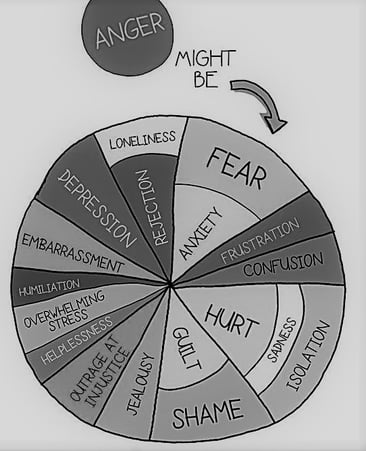As I started thinking about this question, I had to laugh. Why? What’s so funny about an angry spouse? Nothing, really.
I giggled because I know all too well about anger these days. Just this morning, my spouse asked me this question! “Honey, why do you seem so angry lately?” Well, here was my reply to him - via text message too!
"Because I’ve been stuck in this house for months. COVID-19 is still raging, and I know people who are sick and dying. The EU won’t let me into France so that I can visit my only grandchildren. Our country is racially, politically, and culturally divided like never before. I don’t feel safe at restaurants, my hair salon, or the gym. I miss my friends. I miss singing at church. I am worried that my elderly father and uncle might die before I see them again. I’m furious that my aunt’s funeral was on Zoom. I hate this Sheltering at Home weight around my middle. AND, frankly, you’re starting to really annoy me!"
As a Marriage Therapist working online through Zoom for the past five months, I’ve heard a lot about anger from the couples I see. One of my colleagues, Lee Miller, LMFT, taught me that the times we are living in are called VUCA. This is apparently a term used by military leaders to describe the climate of difficult situations and determine the best leadership strategy to move forward. The acronym VUCA stands for volatile, uncertain, complex and ambiguous. As she points out, we are certainly living in VUCA times!
You don’t have to look very far to see examples of anger in our culture. It shows up in the news as domestic violence, child abuse, and workplace disruption. We are angry, stressed-out people who don’t seem to know how to control ourselves very well.
Mental Health Professionals can View Anger as a “Secondary” Emotion.
It’s like an overlay for softer, more vulnerable feelings. Sometimes anger is more energizing than the underlying emotions from which it tries to protect us. Soft emotions like sadness and fear can be debilitating. What feelings come up in you when you consider 2020 so far?
VUCA—volatility, uncertainty, complexity, and ambiguity stir up fear, sadness, anxiety, and grief in me. Life as we knew it has changed, and the changes have not been predictable. Each day seems to bring with it new developments and contradictory information. The couples I work with are more irritable, sometimes specifically with each other, sometimes just taking it out on each other.
Anger can be a Predictable Response to Ongoing Daily Frustrations.
It is a cluster of emotions ranging from annoyance to blinding rage. Once triggered, it changes how we look, how we sound, what we’re thinking, and how we behave. Like all emotional reactions, it comes from the “old brain” or the limbic system where our emotional memories are stored in the amygdala. They’re there in the service of survival. If an old hurtful memory is triggered by something in the present, reacting with anger can help us to survive the reoccurrence of the painful event. This can get activated even when the original danger is long gone.

Annoyance and Frustration can Turn into Anger When a Clear Path to Resolution Isn't Present.
If we don’t have total control over the factors and situations that make us so angry, perhaps we should at least take a look at controlling our angry reactions.
In referring to VUCA times, I’m really talking about how our sadness, fear, and vulnerability are turned to anger because of increased stressors in our lives. A good first step in managing anger is to reduce stress through self-care. I recommend practices like breathwork, meditation, mindfulness, yoga, exercise, or journaling. Through these types of activities, we are calming our nervous systems and learning to resist the pull into the limbic reactivity that fuels anger.
Examine your Thoughts when Trying to Manage your Anger:
We quickly label things that frustrate us and react as if that thought is gospel truth! Asking yourself if something is really true can be a simple step in defusing anger.
For example, the husband of a couple that I see in therapy recently become so angry at his wife that he upended a coffee table. They were both shocked at his behavior, and, as you can imagine, she was mad, hurt, and scared by it. I helped him to examine his anger when he had calmed down. He admitted that he had “seen red” when she criticized his decision to go to a recently opened restaurant with a friend.
By examining his feelings, he was able to see that the thought he had was that she didn’t care about him or his emotional health. That really made him furious after all he’s done for her and how much he cares about her. He knew that despite COVID-19 and the need to socially distance, he experienced feelings of loneliness and isolation and really “needed” to see his friend. He was furious when she questioned his judgment because he thought she really must not care about him! Underneath the anger was deep feelings of fear and sadness.
When asked, he knew that the idea that his wife didn’t really care about him was not a true thought. He was able to name many ways in which she demonstrated her caring.

An Intimate Relationship Thrives with Practicing Good Communication.
This requires taking a deep breath to give yourself a chance to respond rather than react to your partner. Putting a pause between the event and the reaction provides us with an opportunity to choose a more loving, empathetic response. Anger seems to drive more anger, but assertively stating your frustration and asking for what you need can actually calm the situation down and create more connection between the two of you.
In the example above, it would have been far better if my client’s wife had been able to express her fears about the danger of his outing rather than criticizing him. Barring that, he would have been better served by taking a breath and calmly talking about his need to go out with the friend and the fear that she just didn’t care about him. The irony is that her critical statement was born from her deep caring and fear that he’d become sick.
A practice of good communication between them could have helped them avoid the whole unfortunate situation. Sometimes we just need to take a time out and go breathe or self-soothe until we’re able to respond from our cortical, mature brain, rather than from our reactive, emotional one. It’s easier to remove negativity and express empathy for our partner’s softer, vulnerable feelings from this place.
As we Navigate Stressful Times, it’s Essential to Recognize our Anger and Manage it. I Recommend the Following:
-
Take inventory of our stressors and develop practices that de-stress.
-
Pause to find the hurt, sadness, and fear underlying the anger.
-
Examine the “truth” of the thoughts leading to the anger.
-
Learn and practice effective communication tools.
-
Focus on empathy rather than judgment and criticism.

Remember, the Goal isn't to Eliminate the Experience of Anger Totally.
It’s human to get angry at times. Our limbic brains rely on it to get us out of danger or perceived threat. Instead, we must all learn to recognize it and manage it when it occurs. After my text to my husband, I spent some time realizing that there wasn’t much I could do to change the source of my frustration and annoyance. However, I can express it for what it is—grief, sadness, fear, and disappointment. I’ve also become aware that a little yoga and exercise wouldn’t hurt either!
If you're struggling with anger during the COVID-19 pandemic, or in general, check out our Imago Relationship Therapy. We have online therapy available today too!
Discover more about Imago with our Imago Professional Membership, Imago Professional Facilitators, Imago Professional Training and Imago Educational Webinars.
 This blog was written by Mary Kay Cocharo, LMFT.
This blog was written by Mary Kay Cocharo, LMFT.
I am a licensed Marriage and Family Therapist in private practice in West Los Angeles, California. I have 30 years of experience working with individuals, couples, and families. I have two advanced certifications in working with couples: Imago Relationship Therapy and Encounter-centered Couples Therapy.
I work with spouses and parents to deepen communication, resolve conflict and rediscover the joy of being together. In addition to private sessions in my Los Angeles office, I am also passionate about leading workshops for Engaged Couples. With years of experience in premarital counseling, I am happy to offer an Imago based workshop entitled, Start Right, Stay Connected. I also facilitate a Weekend Couples Retreat, Over the Bridge, for couples wanting profound transformation. For couples who desire deep, intensive, quick resolution in a private setting, I also offer one and two-day Private Intensives.
I have also been active throughout my career in educating and training students and interns to become practicing therapists. I have taught and supervised at various universities and training sites around Los Angeles. Prior to coming to California, I served as a team therapist and supervisor at Houston Child Guidance Center working with children and troubled adolescents. I have given numerous workshops and presentations, taught graduate courses, and supervised many interns on their way to becoming licensed.
I am an active member of the California Association for Marriage and Family Therapists, Los Angeles Association for Marriage and Family Therapists, IMAGO Relationship Institute, and the Southern California IMAGO Institute. I am a Master Encounter-centered Couples Therapist. I am active in various spiritual settings and community endeavors. I love my profession and truly enjoy helping others to heal, grow, develop a heightened state of well-being and create more love and peace in their lives.
Several years ago, I co-founded The Conversation Group, an organization of like-minded licensed and pre-licensed therapists. We work with you in a very safe and collaborative way to create conversations that open up paths to clarity, insight, and healing which can motivate movement toward the life you desire. Join our Facebook page for daily meditations and healing quotations.




